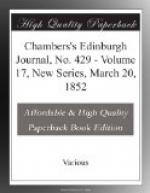Those who dwell on the banks of the Ganges may sometimes see, during the rainy season, a large boat floating past, having a raised cabin, like a Bengalee hut, constructed of mat and straw. From the multiplicity of cages inside and outside, it may be gathered that here are fresh supplies for the bird-fancier—captives from the hills of Rajmahal and Moryheer. The constant fluttering among the inmates of the crowded cages, and their mournful and discordant notes, indicate that they are anything but a happy family—that they have been only recently caught, and are not yet habituated to confinement. They are soon, however, disposed of at the different stations or towns at which the boat anchors, and become in due time the solitary and apparently happy pets I have already described.
I need only add, that there is no lack of pretty little bird-cages in the Far East, constructed very tastefully by the neat-handed natives, and sold for two or three annas.
JUVENILE ENERGY.
In December 1807, W.H. Maynard, Esq., was teaching a school for a quarter in the town of Plainfield, Massachusetts. One cold, blustering morning, on entering his schoolroom, he observed a lad he had not seen before, sitting on one of the benches. The lad soon made known his errand to Mr Maynard. He was fifteen years old; his parents lived seven miles distant; he wanted an education, and had come from home on foot that morning, to see if Mr Maynard could help him to contrive how to obtain it. Mr Maynard asked him if he was acquainted with any one in the place. ‘No.’ ‘Do your parents know any one here?’ ‘No.’ ’Can your parents help you towards obtaining an education?’ ‘No.’ ’Have you any friends that can give you assistance!’ ‘No.’ ’Well, how do you expect to obtain an education?’ ’I don’t know, but I thought I would come and see you.’ Mr Maynard told him to stay that day, and he would see what could be done. He discovered that the boy was possessed of good sense, but no uncommon brilliancy; and he was particularly struck with the cool and resolute manner in which he undertook to conquer difficulties which would have intimidated common minds. In the course of the day, Mr Maynard made provision for having him boarded through the winter in the family with himself, the lad paying for his board by his services out of school. He gave himself diligently to study, in which he made good but not rapid proficiency,




